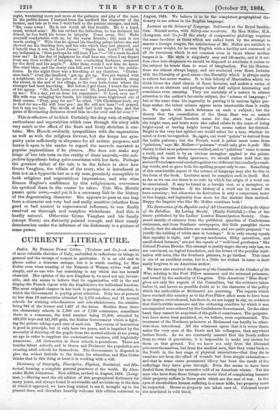The Destruction of the Republic and of All Constitutional Liberty
the Object of the Rebellion. By Loring Moody. (Emily Faithfull.)—One of the tracts published by the Ladies' London Emancipation Society. Com- posed mainly of extracts from the published speeches of Confederate statesmen, and from Southern newspapers, this little pamphlet shows clearly that the slaveholders are consistent, and are quite prepared "to justify the holding of white men in bondage." It is only among equals that equality is right, and "greasy mechanics, filthy operatives, and small-fisted farmers," are not the equals of "well-bred gentlemen" like Colonel Preston Brooks. The attempt to justify negro slavery only has, we are convinced, no logical foundation, and the lovers of the peculiar insti- tution will have, like the Southern planters, to go further. This tract is one of an excellent series, but is a little too violent in tone—a fault easily forgiven to an American author.
We have also received the Reports of the Committee on the Conduct of the War, relating to the Fort Pillow massacre and the returned prisoners, and issued by the authority of Congress. This American "Blue-Book" gives not only the reports of the Committee, but the evidence taken before it, and leaves no possible doubt as to the character of the policy which the authorities at Richmond are pursuing. The reports which have reached this country as to the Fort Pillow affair seem to have been in no degree overcoloured, but there is, we are happy to say, no evidence that that horrible massacre and the sickening cruelties by which it was accompanied were ordered by the Confederate Government. On the other hand, they cannot be acquitted of the guilt of connivance. The perpetra- tors have never been punished, or, we believe, oven reprimanded. The treatment of the Northern prisoners at Richmond can hardly be other- wise than intentionaL All the witnesses agree that it is worse there, under the very eyes of Mr. Davis and his colleagues, than anywhere farther South. As we are constantly assured that the South suffers from no want of provisions, it is impossible to make any excuse for them on that ground. Yet we know not only from the liberated prisoners themselves, but from the medical men, that they come back to the North in the last stage of physical emaciation—that they die in numbers not from the effect of wounds but from simple exhaustion— and that in some eases permanent idiocy has been the result of the sufferings they have gone through. Even fire seems to have been denied them during the excessive cold of an American winter. Yet the men who have done these things are never tired of complaining because their property suffers in those parts which are the seat of war. In the eyes of alaveholders human suffering is a mere trifle, but property must be respected. Slaves as property are taken care of. Coloured troopa are murdered in cold blood.






























 Previous page
Previous page